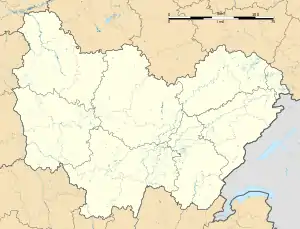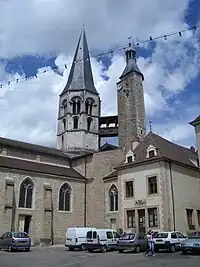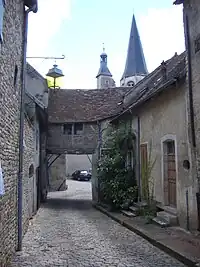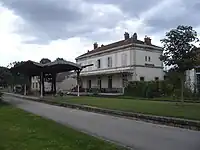Saint-Gengoux-le-National | |
|---|---|
_mairie.JPG.webp) The town hall in Saint-Gengoux-le-National | |
.svg.png.webp) Coat of arms | |
Location of Saint-Gengoux-le-National | |
 Saint-Gengoux-le-National  Saint-Gengoux-le-National | |
| Coordinates: 46°36′53″N 4°39′49″E / 46.6147°N 4.6636°E | |
| Country | France |
| Region | Bourgogne-Franche-Comté |
| Department | Saône-et-Loire |
| Arrondissement | Chalon-sur-Saône |
| Canton | Cluny |
| Government | |
| • Mayor (2020–2026) | Didier Bordet[1] |
| Area 1 | 9.36 km2 (3.61 sq mi) |
| Population | 1,047 |
| • Density | 110/km2 (290/sq mi) |
| Time zone | UTC+01:00 (CET) |
| • Summer (DST) | UTC+02:00 (CEST) |
| INSEE/Postal code | 71417 /71460 |
| Elevation | 193–390 m (633–1,280 ft) (avg. 232 m or 761 ft) |
| 1 French Land Register data, which excludes lakes, ponds, glaciers > 1 km2 (0.386 sq mi or 247 acres) and river estuaries. | |
Saint-Gengoux-le-National (French pronunciation: [sɛ̃ ʒɑ̃ɡu l(ə) nɑsjɔnal]) is a commune in the Saône-et-Loire department in the region of Bourgogne-Franche-Comté in eastern France.
It was formerly known as Saint-Gengoux-le-Royal.
History


In the 10th century, the church of Saint-Gengoux was given to the abbey of Cluny. In the 12th century, the abbot of Cluny requested king Louis VII install a lord of the manor with Saint-Gengoux in order to ensure the safety of the city.
At the revolution, Saint-Gengoux-le-Royal took the name of Saint-Gengoux-le-National. It reverted to Saint-Gengoux-le-Royal is 1834, Saint-Gengoux-le-National in 1848, Saint-Gengoux-le-Royal in 1852 before finally settling on Saint-Gengoux-le-National in 1881.
Geography
The river Grosne forms part of the commune's south-eastern border.
Notable buildings
The church was built in 1120 by the Benedictines of Cluny. It measures 41 m in length and 16 m wide. It was plundered several times and has been heavily restored. The most recent enhancement has been the replacement of the metal bridge between the towers with a wooden one, more in keeping with the Burgundian style. In 1802, three vaults contiguous to the church were destroyed to build a corn exchange on their site.
There are many historic properties from the sixteenth and seventeenth centuries.
Transport

The railway station at Saint-Gengoux-le-National was opened in 1880 on the Chalon-sur-Saône to Mâcon railway line.
After the closure of the railway, in 1996 the 44 km of trackbed from Givry to Cluny has been paved and converted into a cycle route known as the Voie Verte. There are several locations along the route where cycles may be hired, including the station at Saint-Gengoux-le-National.
See also
References
- ↑ "Répertoire national des élus: les maires". data.gouv.fr, Plateforme ouverte des données publiques françaises (in French). 2 December 2020.
- ↑ "Populations légales 2021". The National Institute of Statistics and Economic Studies. 28 December 2023.
- Histoire de Saint Gengoux le Royale, Marie de Saint Gengoux le National, 2005.